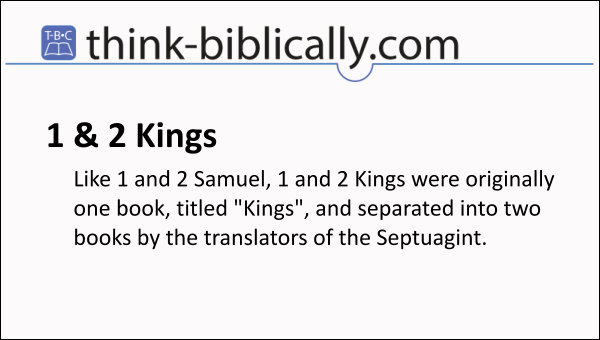By Tyson Thorne

Like 1 and 2 Samuel, 1 and 2 Kings were originally one book, titled "Kings", and separated into two books by the translators of the Septuagint. This singular work was divided with 1 Kings covering the reign of Solomon through Jehoshaphat and explains the division of the kingdom into north and south (about 125 years of history). 2 Kings begins with the rise of King Ahaziah, covers the fall of the two kingdoms concluding with the end of last king Zedekiah and the captivity of the people of Judah (a period of about 250 years). These books are more than a historical record, however.
The purpose of the book as a whole was to reveal the spiritual issues that lead to the division and eventual fall of the kingdom, and God's right to have removed the people from the land. Historically, Biblical scholars have blamed King Rehoboam for the division of the kingdom but a careful reading of 2 Kings reveals that the problems that caused the division began under Solomon's reign.
Solomon worship the foreign gods belonging to some of his wives, breaking the covenant with God and diminishing his most remarkable construction achievement (for which he used slave labor), the building of the first temple. This spiritual sin brought division among the people. To make matters worse, Solomon heavily taxed 11 of the 12 tribes, and exempted Judah from paying anything. He used that tax money to make improvements to Jerusalem (located in Judah) and to enhance the military might protecting the state of Judah. While Solomon's prestige increased, it did so at the cost of his people. By the time Rehoboam came on the scene the country was ripe for civil war.
Later kings would follow these examples and further deteriorate the spiritual condition of the nation, creating hardship for all who wished to follow YHWH according to the Law. This is a lesson modern nations should heed. These activities lead to the conquer of Israel in 722 BC by Assyria, and Judah in 586 BC by Babylon.
Author and Date of Writing
Tradition holds that Jeremiah is the author of Kings, before Juday was taken into captivity, but it would seem that some editing and additions were made to the work while the Israelites were in captivity. This would place the time of writing between 600 and 575 BC. If the original author was not Jeremiah, whomever wrote the book would have used Jeremiah as a source, along with the Annals of Solomon (1 Kings 11.41), Annals of the Kings of Israel (1 Kings 14.19), Annals of the Kings of Judah (1 Kings 14.29) and possibly Isaiah.
Big Idea
God keeps his promises — all of them, including those of disciplining his people should they violate his commandments and the covenant they made with him.
